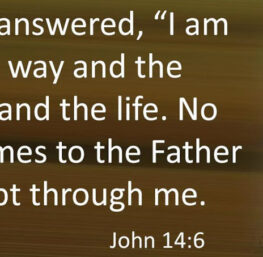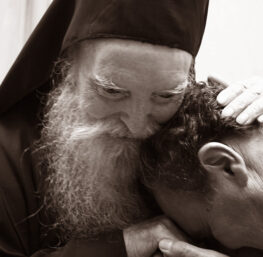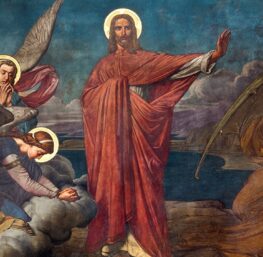First Things | Michael Novak | Jan. 2, 2009
Human liberty depends on an accurate grasp of the human condition, not as we might like it to be, but as it is: “The truth shall set you free.”
Let us suppose, for instance, a situation in which truth is rendered servile by some contemporary enthusiasm. If truth is held captive by a powerful force of attraction, can the human beings who live under that force ever find a way to liberty? Only by luck, great courage, and long perseverance.
During the past hundred years, ideologies have often trumped the unimpeded search for truth. Here is where the sentence from Orwell becomes pivotal. “In a time of universal deceit, telling the truth is a revolutionary act.”
To seek the true reality while everyone around you is applauding what many know to be false is to act as a grown woman or man. It is to show a mind that distinguishes reality from the prevailing prejudices of the age. In fact, a mind committed to finding reality—despite surrounding unreality—is the only free mind.
This is what Thomas Jefferson was suggesting in his classic argument for the Statute of Religious Liberty in Virginia:
Well aware that the opinions and belief of men depend not on their own will, but follow involuntarily the evidence proposed to their minds, that Almighty God hath created the mind free, and manifested his Supreme will that free it shall remain, by making it altogether insusceptible of restraint: That all attempts to influence it by temporal punishments or burthens, are a departure from the plan of the holy author of our religion, who being Lord both of body and mind, yet chose not to propagate it by coercions on either, as was in his Almighty power to do, but to extend it by its influence on reason alone.
The creator so made us that only one thing would oblige us to bend our knee: the evidence grasped by our own minds. This is what Jefferson (and other founders) meant by truth: what the evidence of our own minds enables us to embrace.
[…]
Why is this? Because if there is no truth, no argument is possible in the light of evidence. Under a regime that spouts lies, there is no way to protest in the name of truth. Where truth doesn’t count, conversation is empty. Where truth doesn’t count, persuasion can be no more than seduction or intimidation. Power rules.
Put another way, when power, wealth, and position threaten to tyrannize, people must be able to appeal to truth. Only when truth is cherished as an imperative does civilization becomes possible. Only then can human beings enter into rational conversation with one another. For civilization is constituted by conversation. Barbarians bully; civilized people persuade.
One more point. Being ruled by evidence requires all the habits and dispositions necessary to act with self-mastery. To be free does not mean for humans what it means for the other animals. Two cats that frisk, run, bat each other, roll over, and run again may seem to be free, but they are in fact only following their instincts. Cats do what their instincts tell them, when they tell them. They do what they want, when they want. The trouble is that humans have a far more complicated set of instincts. One of these instincts pushes humans to reflect on their own past actions and future situations in order to judge their realism and ethical value.
Reflection and judgment are the capacities that enable humans to discern what they ought to do. Human beings are the only animals that can choose to reflect on what they ought to do and then to choose to do it. This is what the great historian of liberty, Lord Acton, grasped when he defined liberty as the ability to do not what one wants, but what one ought.
Let me offer concrete examples. George Washington was a model of this type of liberty, as were many other founders: Franklin, Madison, Jefferson, and, four generations later, Abraham Lincoln. These were men who went through many struggles but came out at the end men whose word you could trust; whose commitments you could count on; whose judgments about men and affairs were shrewd and often (for all their plainness of statement) startlingly apt. Their deliberations showed the work of reason in a great repertoire of movements and a great range of mood and observations; and their decisions hewed closely to enduring truths about the human person.
Thus, our argument has come full circle. One thing a free person is not free to do—unless in betrayal—is to turn his or her face against the evidence. Evidence binds us, and also makes us free from all else. This, at least, is how I read Jefferson, who implies that our minds must be free from every coercion except one; the coercion effected upon the mind by evidence. The mind that is coerced by nothing but the evidence is free. The mind coerced by anything but truth is unfree.
The rationale for defending liberty is to come closer to the truth. The rationale for defending truth is that its light shows us the way to freedom.
Without widespread commitment to the moral habits that make liberty and truth more than words on paper, it is hard to see how a republic can long endure. Our rights are not protected by words on a paper. They are protected by habits that exhibit respect for truth and a love for self-mastery. If I may again paraphrase George Orwell: In an age of deceit, seeking truth is a liberating act.
. . . more




What are we to do when any politician who seeks the truth is unelectable because ‘freedom’ has been culturally defined in animalistic terms–doing what you want when you want. Only self-restraint and self-mastery are ridiculed. The job of government is to make certain that favored classes are able to do whatever they want without any consequences.
Even what is considered evidence is determined by a poltical agenda rather than what is real and truth is nowhere in the equation. The whole understanding of what is human is under attack by the ideologies that drive our politics, our science and our economics as well as our personal ‘ethics’. All leadership has become pandering entertainment–bread and circuses. We don’t even have a Cicero as one crying out in the wilderness. Everyone has long since been corrupted. Money and power the sole arbiter of success and therefore truth. And the Church plays along grasping for any scraps that the powerful might decide to throw our way and many if not most Christians are functional atheists. Refusing to believe and act as the Church has tradtionally taught: “Submit yourself all ye nations, for God is with us.”
Mr. Novak’s emphasis on reason is just part of the problem–it is a tired old , even blashphemous anthropology that truncates who we really are. Christianity is un-reasonable. Heresy is reasonable. Ideologies always appeal to our rationality in order to inflame our emotions and self-interest. Reason is only as good as the assumptions from which it starts, the faith that powers its logic. If we don’t begin with submission to God, we are already lost. When we eliminate Jesus’ first commandment and humanistically try to apply ‘love your neighbor as yourself’, the second commandment gets twisted into “give me what I want or you don’t love me.”
As Fr. Seraphim Rose so poignantly pointed out:
There is no reasonable way to love. There is only a reasonable way to act from love. We cannot reason our way to love, but we can love our way to truth. In FACT, that is the only way to know truth. It is un-reasonable for me to believe and act as if I am the greatest sinner because everybody knows rationally that there are many who sin worse. Yet the Church calls us to just such an un-reasonable understanding of who we are. Everything Christ asks of us is un-reasonable starting with the most unfathomable, unreasonable statement ever made. “God so loved the world that He gave His only begotten Son…” Of course that is the only ‘reason’ He can ask of us what He does: That we love Him above all. As St. Herman pointed out, when we love someone, we think of them continually, we seek to please them continually, we change our behavior so that we can be pleasing to them, we seek their good above our own. What makes us happy is the happiness of the beloved.
Knowing truth even in the impersonal, rational sense requires two things: humility and repentance. Not someone else’s repentance, not a cultural repentance, but a personal repentance before God, asking His forgiveness for all the times we have rejected Him, forgotten Him, neglected Him.